Work Ethics and Employee Behavior in Australia's Hotel Industry
VerifiedAdded on 2023/06/15
|23
|6538
|217
Report
AI Summary
This report investigates the relationship between work ethics and employee behavior in the Australian hospitality industry. It begins by outlining the research problem, purpose, aims, and significance, then reviews literature on employee behavior as an independent variable and work ethics as a dependent variable, including relevant behavioral management theories. The research methodology section details the research design, philosophy, approach, sampling technique, data collection method, and ethical considerations. The discussion and analysis section presents qualitative research findings, followed by recommendations and a conclusion that emphasizes the importance of ethical practices in shaping employee behavior and organizational success. The study highlights the need for hospitality enterprises to address ethical issues, promote a positive work environment, and foster ethical leadership to enhance employee performance and customer satisfaction. Desklib provides access to this and other solved assignments to aid students in their studies.
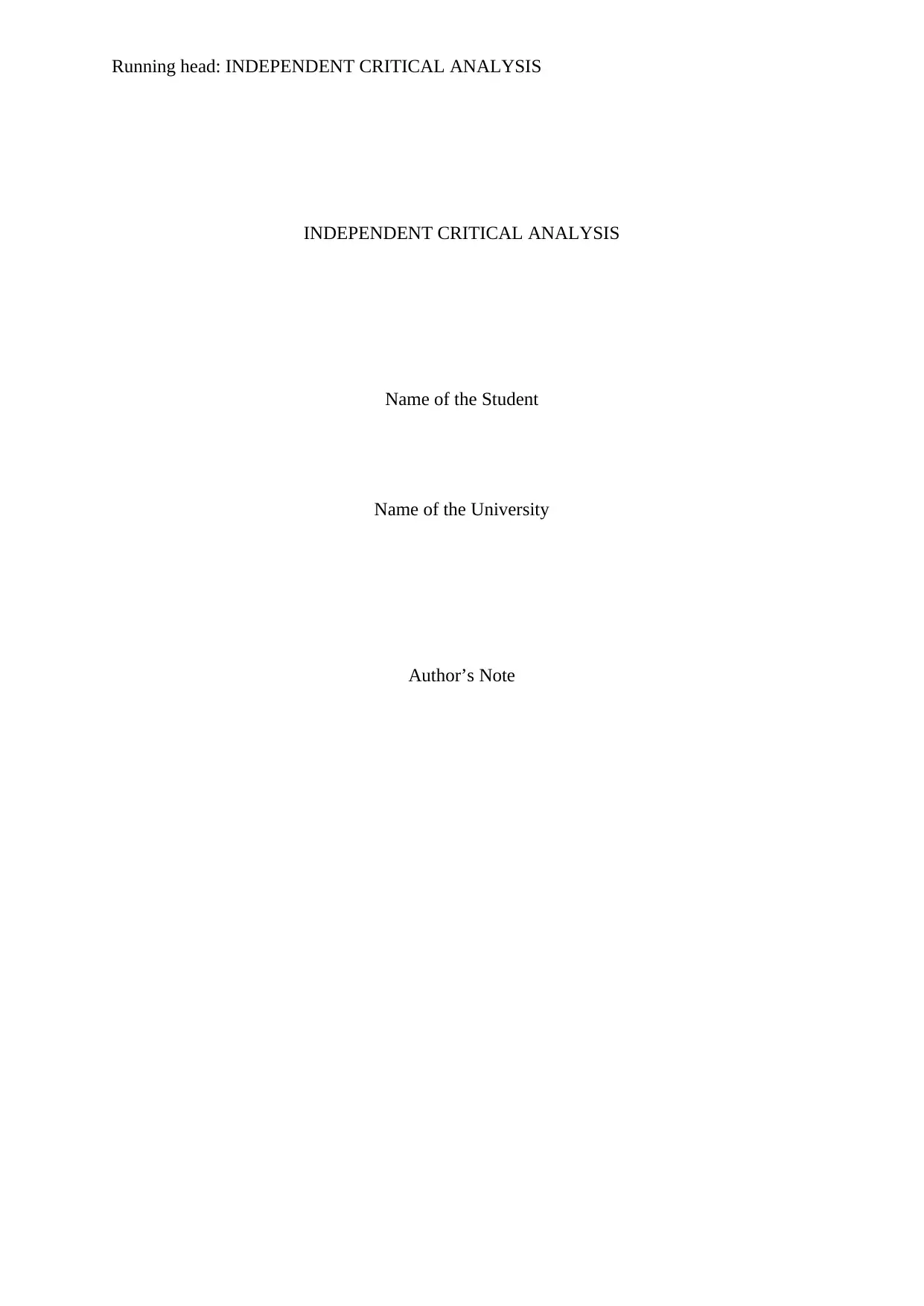
Running head: INDEPENDENT CRITICAL ANALYSIS
INDEPENDENT CRITICAL ANALYSIS
Name of the Student
Name of the University
Author’s Note
INDEPENDENT CRITICAL ANALYSIS
Name of the Student
Name of the University
Author’s Note
Paraphrase This Document
Need a fresh take? Get an instant paraphrase of this document with our AI Paraphraser
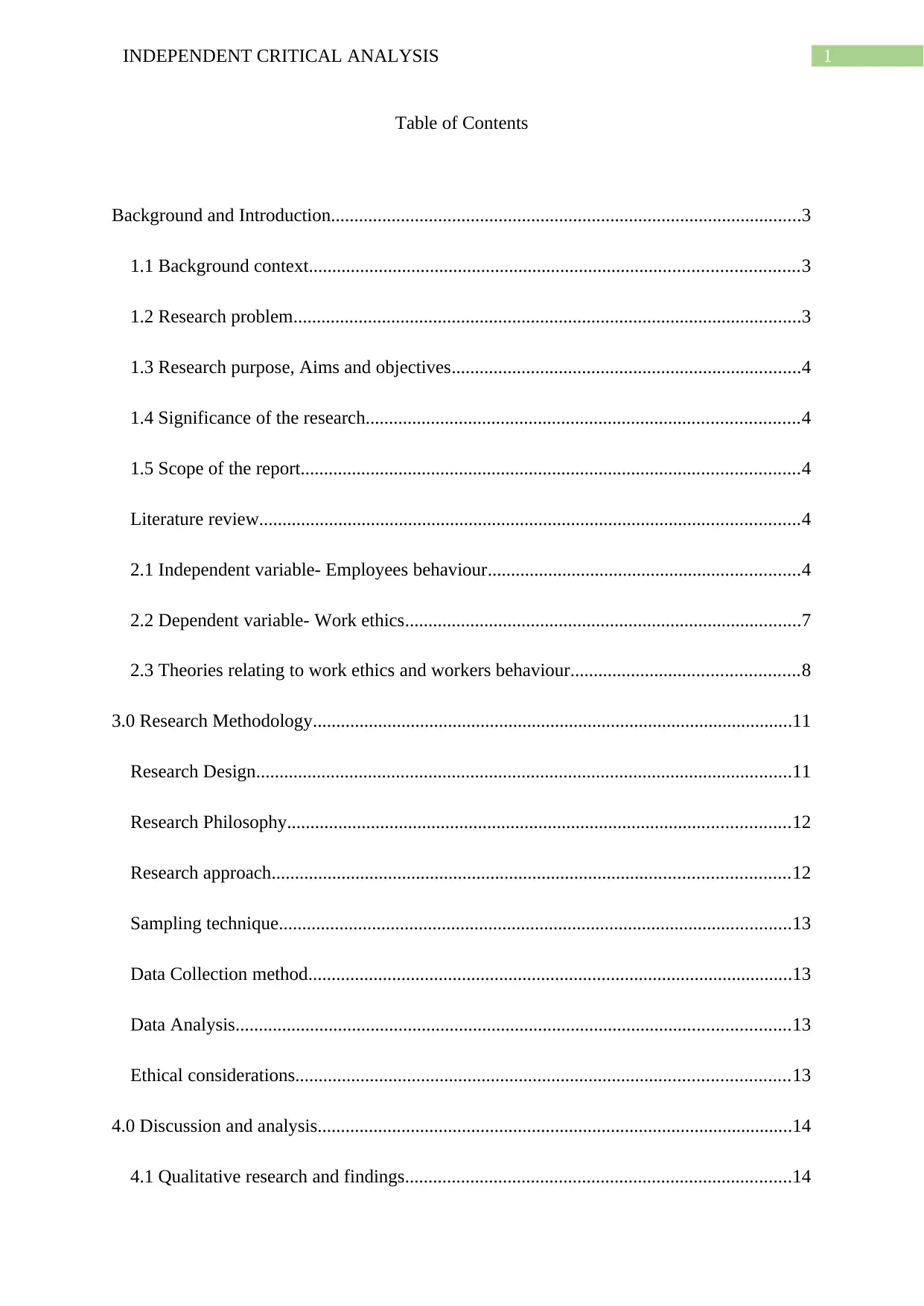
1INDEPENDENT CRITICAL ANALYSIS
Table of Contents
Background and Introduction.....................................................................................................3
1.1 Background context.........................................................................................................3
1.2 Research problem.............................................................................................................3
1.3 Research purpose, Aims and objectives...........................................................................4
1.4 Significance of the research.............................................................................................4
1.5 Scope of the report...........................................................................................................4
Literature review....................................................................................................................4
2.1 Independent variable- Employees behaviour...................................................................4
2.2 Dependent variable- Work ethics.....................................................................................7
2.3 Theories relating to work ethics and workers behaviour.................................................8
3.0 Research Methodology.......................................................................................................11
Research Design...................................................................................................................11
Research Philosophy............................................................................................................12
Research approach...............................................................................................................12
Sampling technique..............................................................................................................13
Data Collection method........................................................................................................13
Data Analysis.......................................................................................................................13
Ethical considerations..........................................................................................................13
4.0 Discussion and analysis......................................................................................................14
4.1 Qualitative research and findings...................................................................................14
Table of Contents
Background and Introduction.....................................................................................................3
1.1 Background context.........................................................................................................3
1.2 Research problem.............................................................................................................3
1.3 Research purpose, Aims and objectives...........................................................................4
1.4 Significance of the research.............................................................................................4
1.5 Scope of the report...........................................................................................................4
Literature review....................................................................................................................4
2.1 Independent variable- Employees behaviour...................................................................4
2.2 Dependent variable- Work ethics.....................................................................................7
2.3 Theories relating to work ethics and workers behaviour.................................................8
3.0 Research Methodology.......................................................................................................11
Research Design...................................................................................................................11
Research Philosophy............................................................................................................12
Research approach...............................................................................................................12
Sampling technique..............................................................................................................13
Data Collection method........................................................................................................13
Data Analysis.......................................................................................................................13
Ethical considerations..........................................................................................................13
4.0 Discussion and analysis......................................................................................................14
4.1 Qualitative research and findings...................................................................................14
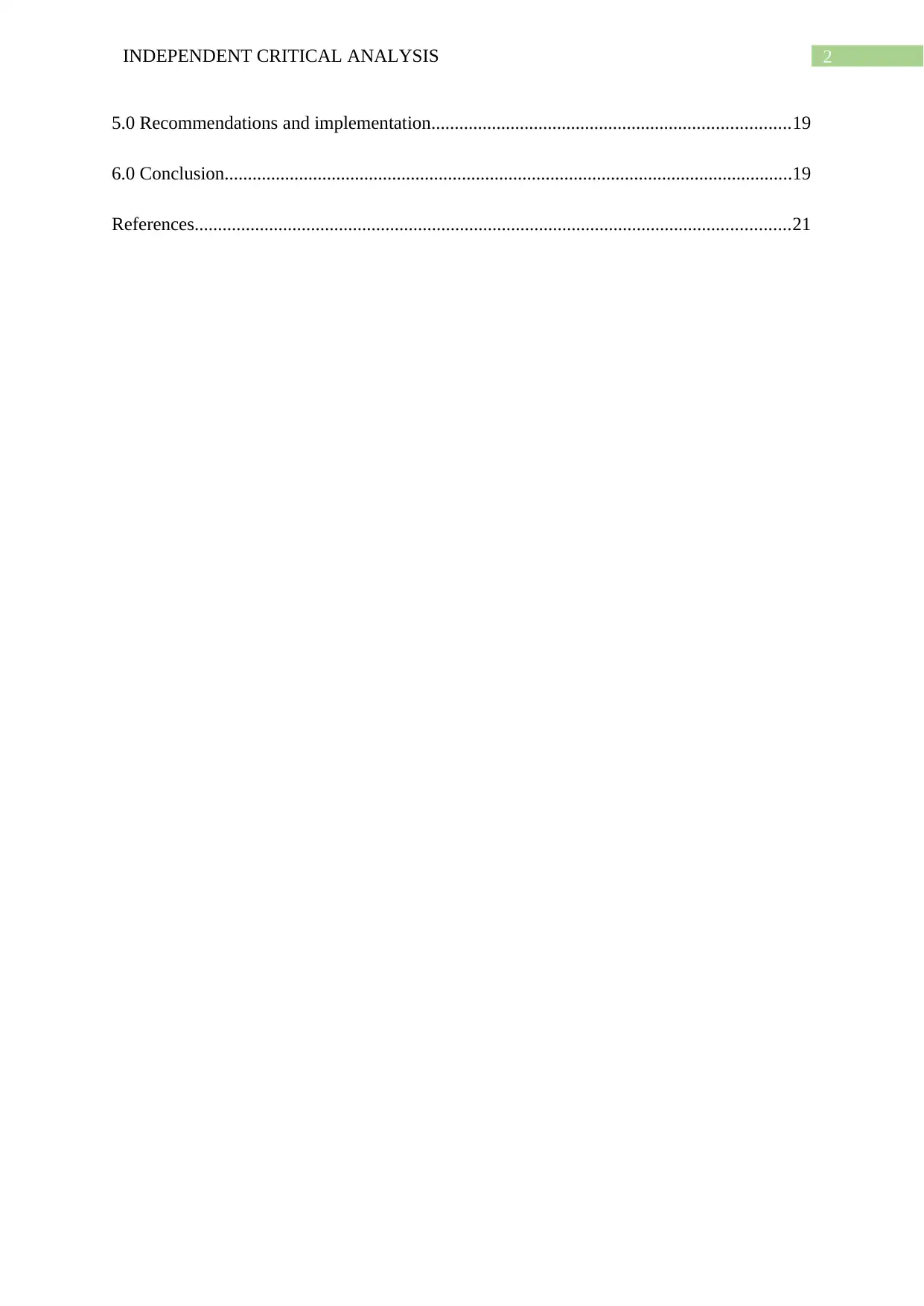
2INDEPENDENT CRITICAL ANALYSIS
5.0 Recommendations and implementation.............................................................................19
6.0 Conclusion..........................................................................................................................19
References................................................................................................................................21
5.0 Recommendations and implementation.............................................................................19
6.0 Conclusion..........................................................................................................................19
References................................................................................................................................21
⊘ This is a preview!⊘
Do you want full access?
Subscribe today to unlock all pages.

Trusted by 1+ million students worldwide
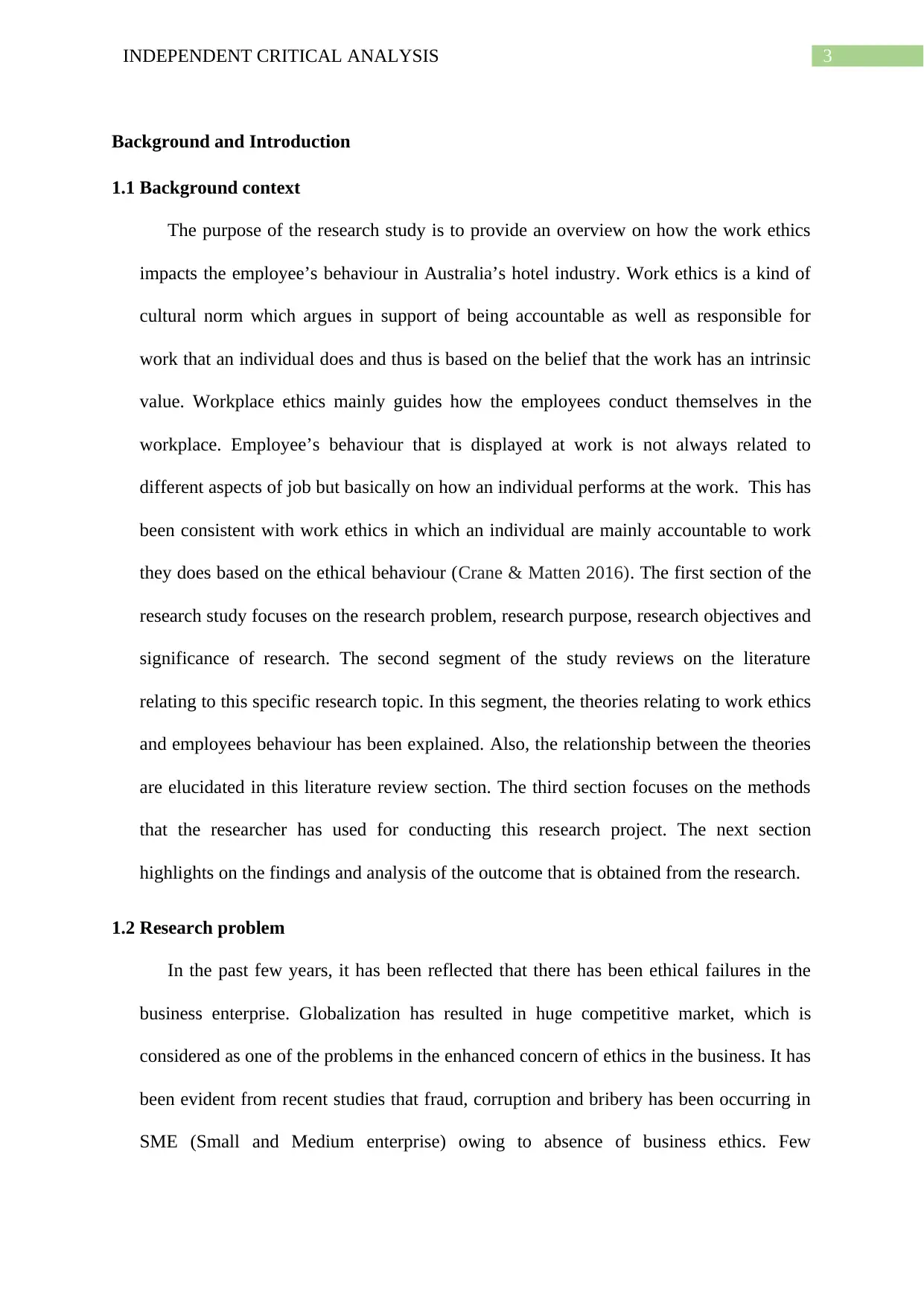
3INDEPENDENT CRITICAL ANALYSIS
Background and Introduction
1.1 Background context
The purpose of the research study is to provide an overview on how the work ethics
impacts the employee’s behaviour in Australia’s hotel industry. Work ethics is a kind of
cultural norm which argues in support of being accountable as well as responsible for
work that an individual does and thus is based on the belief that the work has an intrinsic
value. Workplace ethics mainly guides how the employees conduct themselves in the
workplace. Employee’s behaviour that is displayed at work is not always related to
different aspects of job but basically on how an individual performs at the work. This has
been consistent with work ethics in which an individual are mainly accountable to work
they does based on the ethical behaviour (Crane & Matten 2016). The first section of the
research study focuses on the research problem, research purpose, research objectives and
significance of research. The second segment of the study reviews on the literature
relating to this specific research topic. In this segment, the theories relating to work ethics
and employees behaviour has been explained. Also, the relationship between the theories
are elucidated in this literature review section. The third section focuses on the methods
that the researcher has used for conducting this research project. The next section
highlights on the findings and analysis of the outcome that is obtained from the research.
1.2 Research problem
In the past few years, it has been reflected that there has been ethical failures in the
business enterprise. Globalization has resulted in huge competitive market, which is
considered as one of the problems in the enhanced concern of ethics in the business. It has
been evident from recent studies that fraud, corruption and bribery has been occurring in
SME (Small and Medium enterprise) owing to absence of business ethics. Few
Background and Introduction
1.1 Background context
The purpose of the research study is to provide an overview on how the work ethics
impacts the employee’s behaviour in Australia’s hotel industry. Work ethics is a kind of
cultural norm which argues in support of being accountable as well as responsible for
work that an individual does and thus is based on the belief that the work has an intrinsic
value. Workplace ethics mainly guides how the employees conduct themselves in the
workplace. Employee’s behaviour that is displayed at work is not always related to
different aspects of job but basically on how an individual performs at the work. This has
been consistent with work ethics in which an individual are mainly accountable to work
they does based on the ethical behaviour (Crane & Matten 2016). The first section of the
research study focuses on the research problem, research purpose, research objectives and
significance of research. The second segment of the study reviews on the literature
relating to this specific research topic. In this segment, the theories relating to work ethics
and employees behaviour has been explained. Also, the relationship between the theories
are elucidated in this literature review section. The third section focuses on the methods
that the researcher has used for conducting this research project. The next section
highlights on the findings and analysis of the outcome that is obtained from the research.
1.2 Research problem
In the past few years, it has been reflected that there has been ethical failures in the
business enterprise. Globalization has resulted in huge competitive market, which is
considered as one of the problems in the enhanced concern of ethics in the business. It has
been evident from recent studies that fraud, corruption and bribery has been occurring in
SME (Small and Medium enterprise) owing to absence of business ethics. Few
Paraphrase This Document
Need a fresh take? Get an instant paraphrase of this document with our AI Paraphraser
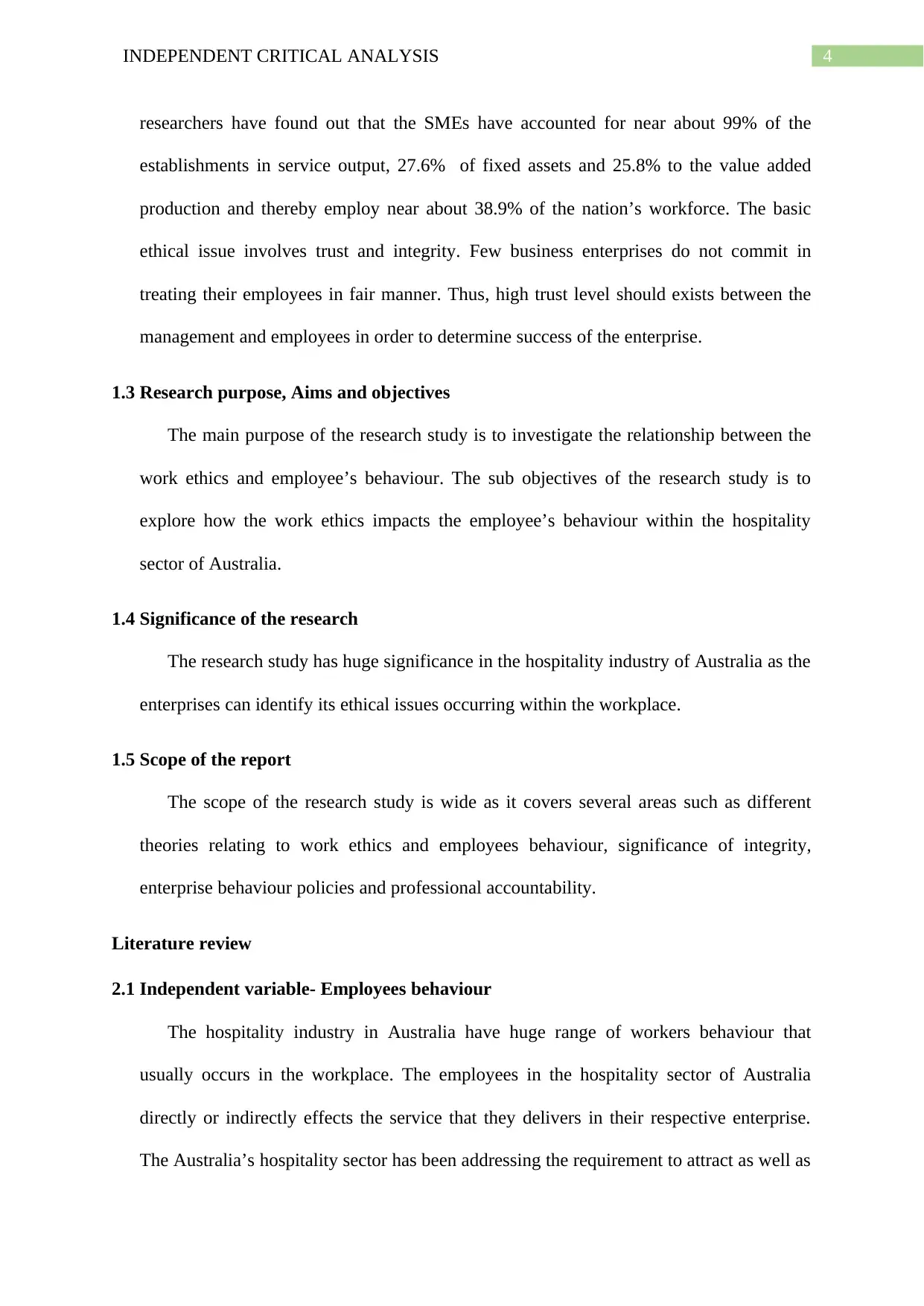
4INDEPENDENT CRITICAL ANALYSIS
researchers have found out that the SMEs have accounted for near about 99% of the
establishments in service output, 27.6% of fixed assets and 25.8% to the value added
production and thereby employ near about 38.9% of the nation’s workforce. The basic
ethical issue involves trust and integrity. Few business enterprises do not commit in
treating their employees in fair manner. Thus, high trust level should exists between the
management and employees in order to determine success of the enterprise.
1.3 Research purpose, Aims and objectives
The main purpose of the research study is to investigate the relationship between the
work ethics and employee’s behaviour. The sub objectives of the research study is to
explore how the work ethics impacts the employee’s behaviour within the hospitality
sector of Australia.
1.4 Significance of the research
The research study has huge significance in the hospitality industry of Australia as the
enterprises can identify its ethical issues occurring within the workplace.
1.5 Scope of the report
The scope of the research study is wide as it covers several areas such as different
theories relating to work ethics and employees behaviour, significance of integrity,
enterprise behaviour policies and professional accountability.
Literature review
2.1 Independent variable- Employees behaviour
The hospitality industry in Australia have huge range of workers behaviour that
usually occurs in the workplace. The employees in the hospitality sector of Australia
directly or indirectly effects the service that they delivers in their respective enterprise.
The Australia’s hospitality sector has been addressing the requirement to attract as well as
researchers have found out that the SMEs have accounted for near about 99% of the
establishments in service output, 27.6% of fixed assets and 25.8% to the value added
production and thereby employ near about 38.9% of the nation’s workforce. The basic
ethical issue involves trust and integrity. Few business enterprises do not commit in
treating their employees in fair manner. Thus, high trust level should exists between the
management and employees in order to determine success of the enterprise.
1.3 Research purpose, Aims and objectives
The main purpose of the research study is to investigate the relationship between the
work ethics and employee’s behaviour. The sub objectives of the research study is to
explore how the work ethics impacts the employee’s behaviour within the hospitality
sector of Australia.
1.4 Significance of the research
The research study has huge significance in the hospitality industry of Australia as the
enterprises can identify its ethical issues occurring within the workplace.
1.5 Scope of the report
The scope of the research study is wide as it covers several areas such as different
theories relating to work ethics and employees behaviour, significance of integrity,
enterprise behaviour policies and professional accountability.
Literature review
2.1 Independent variable- Employees behaviour
The hospitality industry in Australia have huge range of workers behaviour that
usually occurs in the workplace. The employees in the hospitality sector of Australia
directly or indirectly effects the service that they delivers in their respective enterprise.
The Australia’s hospitality sector has been addressing the requirement to attract as well as
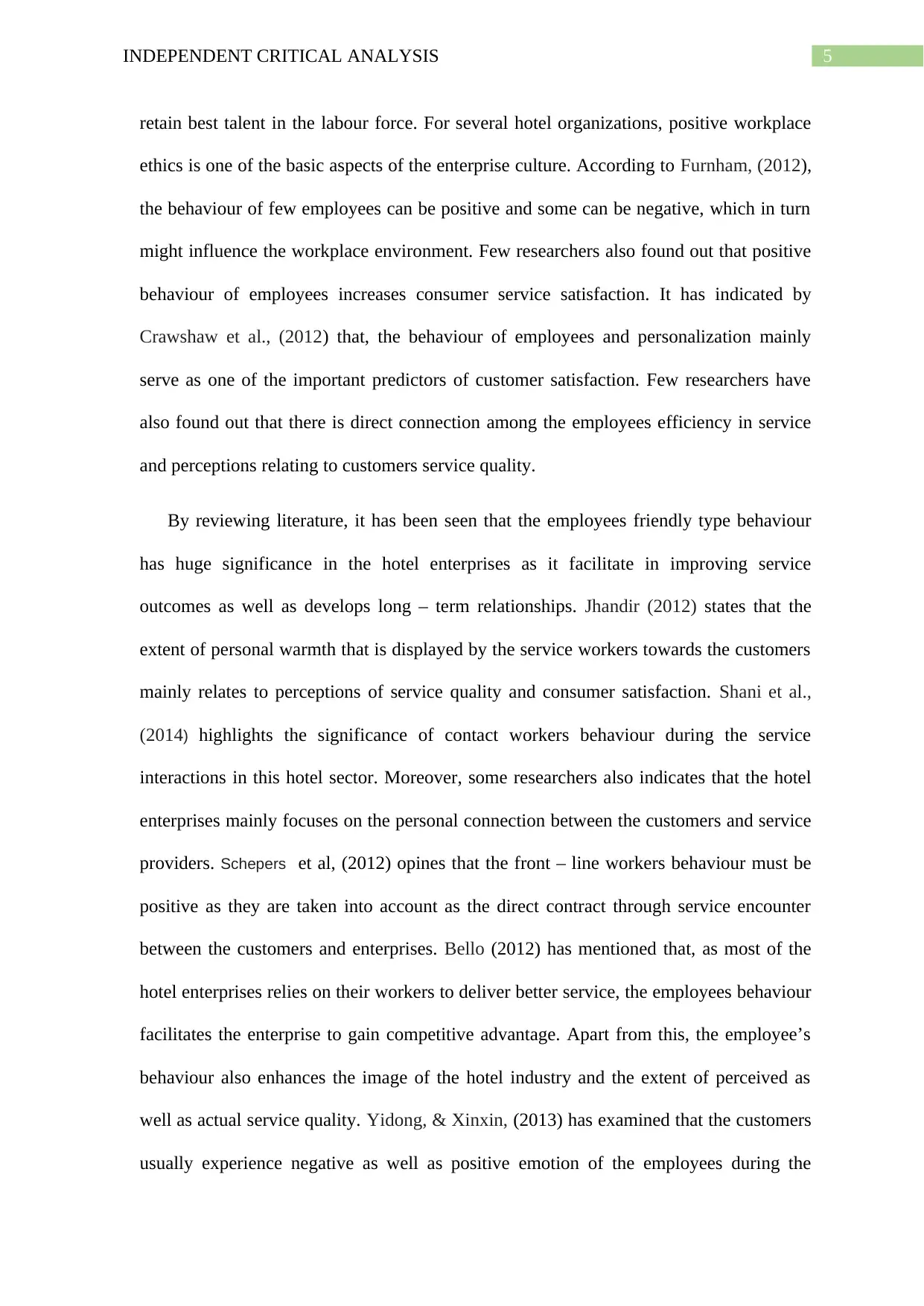
5INDEPENDENT CRITICAL ANALYSIS
retain best talent in the labour force. For several hotel organizations, positive workplace
ethics is one of the basic aspects of the enterprise culture. According to Furnham, (2012),
the behaviour of few employees can be positive and some can be negative, which in turn
might influence the workplace environment. Few researchers also found out that positive
behaviour of employees increases consumer service satisfaction. It has indicated by
Crawshaw et al., (2012) that, the behaviour of employees and personalization mainly
serve as one of the important predictors of customer satisfaction. Few researchers have
also found out that there is direct connection among the employees efficiency in service
and perceptions relating to customers service quality.
By reviewing literature, it has been seen that the employees friendly type behaviour
has huge significance in the hotel enterprises as it facilitate in improving service
outcomes as well as develops long – term relationships. Jhandir (2012) states that the
extent of personal warmth that is displayed by the service workers towards the customers
mainly relates to perceptions of service quality and consumer satisfaction. Shani et al.,
(2014) highlights the significance of contact workers behaviour during the service
interactions in this hotel sector. Moreover, some researchers also indicates that the hotel
enterprises mainly focuses on the personal connection between the customers and service
providers. Schepers et al, (2012) opines that the front – line workers behaviour must be
positive as they are taken into account as the direct contract through service encounter
between the customers and enterprises. Bello (2012) has mentioned that, as most of the
hotel enterprises relies on their workers to deliver better service, the employees behaviour
facilitates the enterprise to gain competitive advantage. Apart from this, the employee’s
behaviour also enhances the image of the hotel industry and the extent of perceived as
well as actual service quality. Yidong, & Xinxin, (2013) has examined that the customers
usually experience negative as well as positive emotion of the employees during the
retain best talent in the labour force. For several hotel organizations, positive workplace
ethics is one of the basic aspects of the enterprise culture. According to Furnham, (2012),
the behaviour of few employees can be positive and some can be negative, which in turn
might influence the workplace environment. Few researchers also found out that positive
behaviour of employees increases consumer service satisfaction. It has indicated by
Crawshaw et al., (2012) that, the behaviour of employees and personalization mainly
serve as one of the important predictors of customer satisfaction. Few researchers have
also found out that there is direct connection among the employees efficiency in service
and perceptions relating to customers service quality.
By reviewing literature, it has been seen that the employees friendly type behaviour
has huge significance in the hotel enterprises as it facilitate in improving service
outcomes as well as develops long – term relationships. Jhandir (2012) states that the
extent of personal warmth that is displayed by the service workers towards the customers
mainly relates to perceptions of service quality and consumer satisfaction. Shani et al.,
(2014) highlights the significance of contact workers behaviour during the service
interactions in this hotel sector. Moreover, some researchers also indicates that the hotel
enterprises mainly focuses on the personal connection between the customers and service
providers. Schepers et al, (2012) opines that the front – line workers behaviour must be
positive as they are taken into account as the direct contract through service encounter
between the customers and enterprises. Bello (2012) has mentioned that, as most of the
hotel enterprises relies on their workers to deliver better service, the employees behaviour
facilitates the enterprise to gain competitive advantage. Apart from this, the employee’s
behaviour also enhances the image of the hotel industry and the extent of perceived as
well as actual service quality. Yidong, & Xinxin, (2013) has examined that the customers
usually experience negative as well as positive emotion of the employees during the
⊘ This is a preview!⊘
Do you want full access?
Subscribe today to unlock all pages.

Trusted by 1+ million students worldwide
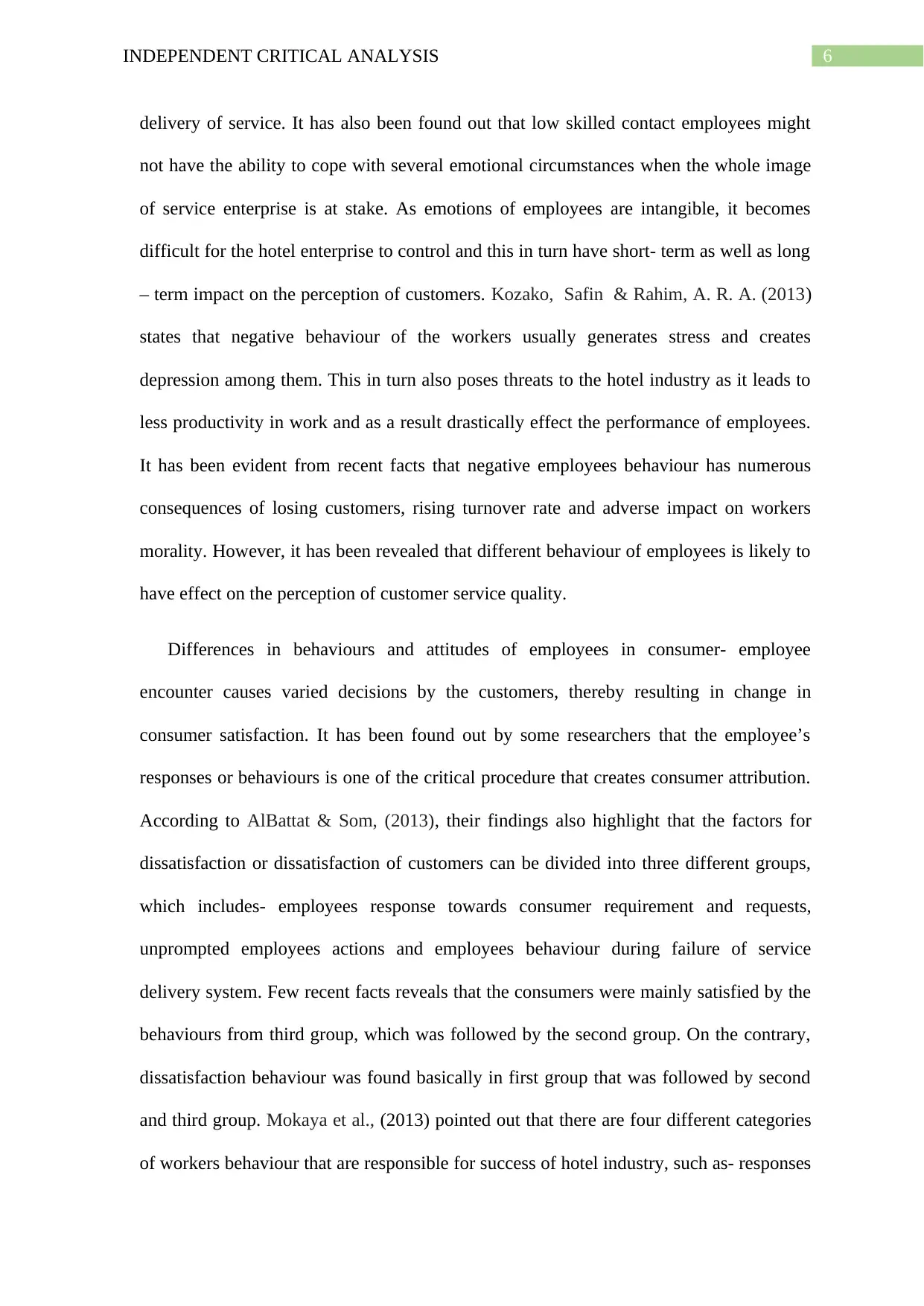
6INDEPENDENT CRITICAL ANALYSIS
delivery of service. It has also been found out that low skilled contact employees might
not have the ability to cope with several emotional circumstances when the whole image
of service enterprise is at stake. As emotions of employees are intangible, it becomes
difficult for the hotel enterprise to control and this in turn have short- term as well as long
– term impact on the perception of customers. Kozako, Safin & Rahim, A. R. A. (2013)
states that negative behaviour of the workers usually generates stress and creates
depression among them. This in turn also poses threats to the hotel industry as it leads to
less productivity in work and as a result drastically effect the performance of employees.
It has been evident from recent facts that negative employees behaviour has numerous
consequences of losing customers, rising turnover rate and adverse impact on workers
morality. However, it has been revealed that different behaviour of employees is likely to
have effect on the perception of customer service quality.
Differences in behaviours and attitudes of employees in consumer- employee
encounter causes varied decisions by the customers, thereby resulting in change in
consumer satisfaction. It has been found out by some researchers that the employee’s
responses or behaviours is one of the critical procedure that creates consumer attribution.
According to AlBattat & Som, (2013), their findings also highlight that the factors for
dissatisfaction or dissatisfaction of customers can be divided into three different groups,
which includes- employees response towards consumer requirement and requests,
unprompted employees actions and employees behaviour during failure of service
delivery system. Few recent facts reveals that the consumers were mainly satisfied by the
behaviours from third group, which was followed by the second group. On the contrary,
dissatisfaction behaviour was found basically in first group that was followed by second
and third group. Mokaya et al., (2013) pointed out that there are four different categories
of workers behaviour that are responsible for success of hotel industry, such as- responses
delivery of service. It has also been found out that low skilled contact employees might
not have the ability to cope with several emotional circumstances when the whole image
of service enterprise is at stake. As emotions of employees are intangible, it becomes
difficult for the hotel enterprise to control and this in turn have short- term as well as long
– term impact on the perception of customers. Kozako, Safin & Rahim, A. R. A. (2013)
states that negative behaviour of the workers usually generates stress and creates
depression among them. This in turn also poses threats to the hotel industry as it leads to
less productivity in work and as a result drastically effect the performance of employees.
It has been evident from recent facts that negative employees behaviour has numerous
consequences of losing customers, rising turnover rate and adverse impact on workers
morality. However, it has been revealed that different behaviour of employees is likely to
have effect on the perception of customer service quality.
Differences in behaviours and attitudes of employees in consumer- employee
encounter causes varied decisions by the customers, thereby resulting in change in
consumer satisfaction. It has been found out by some researchers that the employee’s
responses or behaviours is one of the critical procedure that creates consumer attribution.
According to AlBattat & Som, (2013), their findings also highlight that the factors for
dissatisfaction or dissatisfaction of customers can be divided into three different groups,
which includes- employees response towards consumer requirement and requests,
unprompted employees actions and employees behaviour during failure of service
delivery system. Few recent facts reveals that the consumers were mainly satisfied by the
behaviours from third group, which was followed by the second group. On the contrary,
dissatisfaction behaviour was found basically in first group that was followed by second
and third group. Mokaya et al., (2013) pointed out that there are four different categories
of workers behaviour that are responsible for success of hotel industry, such as- responses
Paraphrase This Document
Need a fresh take? Get an instant paraphrase of this document with our AI Paraphraser
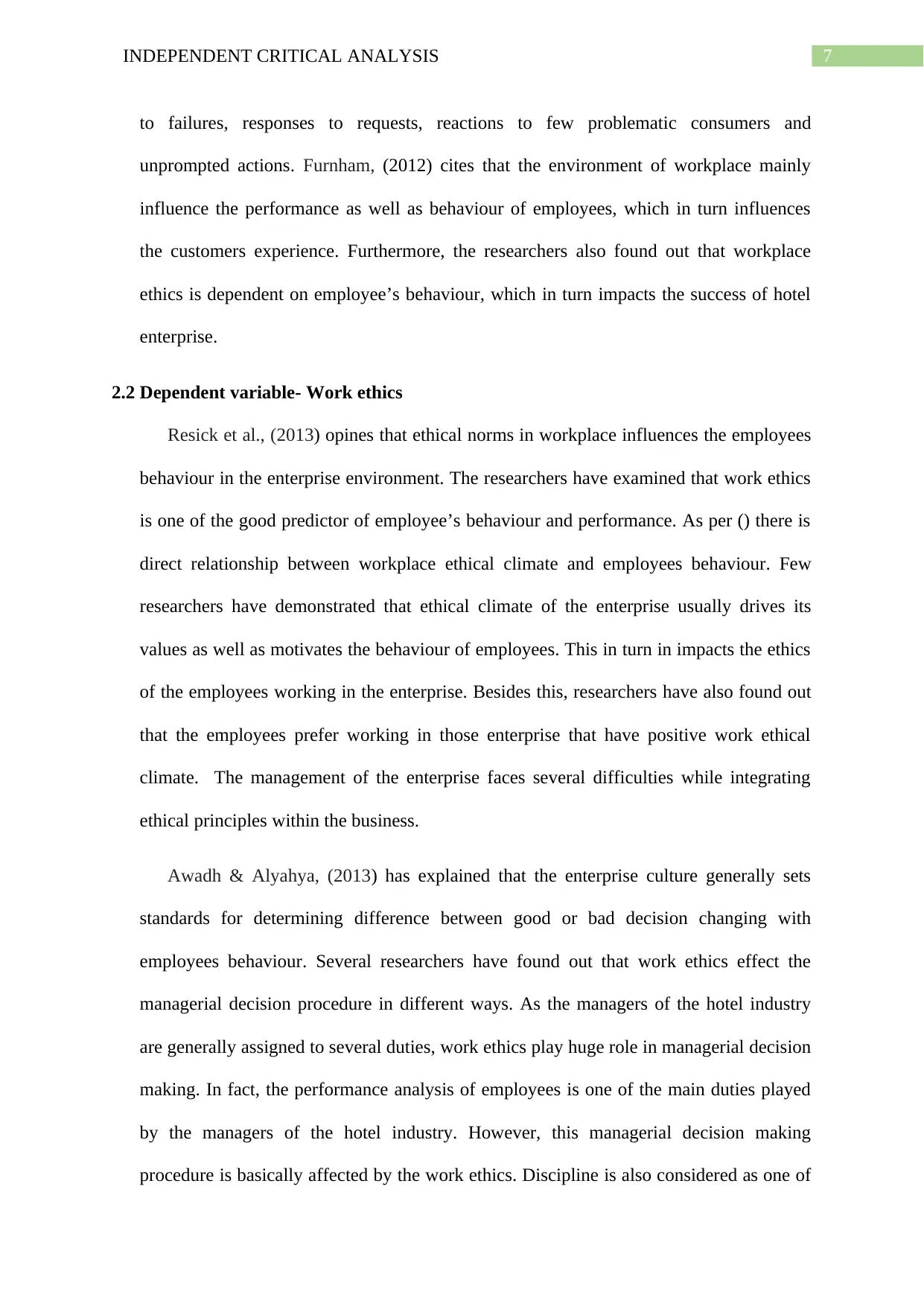
7INDEPENDENT CRITICAL ANALYSIS
to failures, responses to requests, reactions to few problematic consumers and
unprompted actions. Furnham, (2012) cites that the environment of workplace mainly
influence the performance as well as behaviour of employees, which in turn influences
the customers experience. Furthermore, the researchers also found out that workplace
ethics is dependent on employee’s behaviour, which in turn impacts the success of hotel
enterprise.
2.2 Dependent variable- Work ethics
Resick et al., (2013) opines that ethical norms in workplace influences the employees
behaviour in the enterprise environment. The researchers have examined that work ethics
is one of the good predictor of employee’s behaviour and performance. As per () there is
direct relationship between workplace ethical climate and employees behaviour. Few
researchers have demonstrated that ethical climate of the enterprise usually drives its
values as well as motivates the behaviour of employees. This in turn in impacts the ethics
of the employees working in the enterprise. Besides this, researchers have also found out
that the employees prefer working in those enterprise that have positive work ethical
climate. The management of the enterprise faces several difficulties while integrating
ethical principles within the business.
Awadh & Alyahya, (2013) has explained that the enterprise culture generally sets
standards for determining difference between good or bad decision changing with
employees behaviour. Several researchers have found out that work ethics effect the
managerial decision procedure in different ways. As the managers of the hotel industry
are generally assigned to several duties, work ethics play huge role in managerial decision
making. In fact, the performance analysis of employees is one of the main duties played
by the managers of the hotel industry. However, this managerial decision making
procedure is basically affected by the work ethics. Discipline is also considered as one of
to failures, responses to requests, reactions to few problematic consumers and
unprompted actions. Furnham, (2012) cites that the environment of workplace mainly
influence the performance as well as behaviour of employees, which in turn influences
the customers experience. Furthermore, the researchers also found out that workplace
ethics is dependent on employee’s behaviour, which in turn impacts the success of hotel
enterprise.
2.2 Dependent variable- Work ethics
Resick et al., (2013) opines that ethical norms in workplace influences the employees
behaviour in the enterprise environment. The researchers have examined that work ethics
is one of the good predictor of employee’s behaviour and performance. As per () there is
direct relationship between workplace ethical climate and employees behaviour. Few
researchers have demonstrated that ethical climate of the enterprise usually drives its
values as well as motivates the behaviour of employees. This in turn in impacts the ethics
of the employees working in the enterprise. Besides this, researchers have also found out
that the employees prefer working in those enterprise that have positive work ethical
climate. The management of the enterprise faces several difficulties while integrating
ethical principles within the business.
Awadh & Alyahya, (2013) has explained that the enterprise culture generally sets
standards for determining difference between good or bad decision changing with
employees behaviour. Several researchers have found out that work ethics effect the
managerial decision procedure in different ways. As the managers of the hotel industry
are generally assigned to several duties, work ethics play huge role in managerial decision
making. In fact, the performance analysis of employees is one of the main duties played
by the managers of the hotel industry. However, this managerial decision making
procedure is basically affected by the work ethics. Discipline is also considered as one of
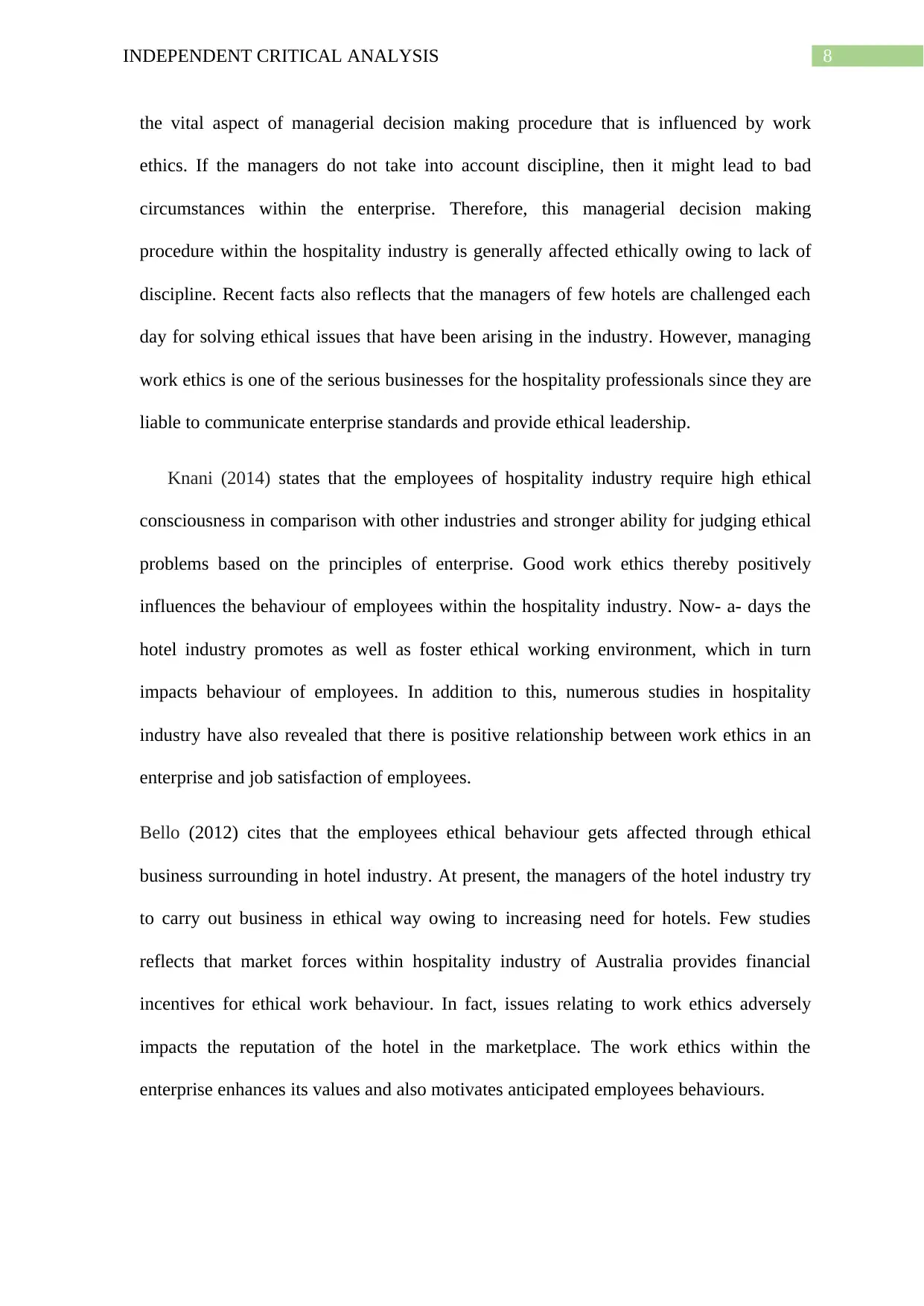
8INDEPENDENT CRITICAL ANALYSIS
the vital aspect of managerial decision making procedure that is influenced by work
ethics. If the managers do not take into account discipline, then it might lead to bad
circumstances within the enterprise. Therefore, this managerial decision making
procedure within the hospitality industry is generally affected ethically owing to lack of
discipline. Recent facts also reflects that the managers of few hotels are challenged each
day for solving ethical issues that have been arising in the industry. However, managing
work ethics is one of the serious businesses for the hospitality professionals since they are
liable to communicate enterprise standards and provide ethical leadership.
Knani (2014) states that the employees of hospitality industry require high ethical
consciousness in comparison with other industries and stronger ability for judging ethical
problems based on the principles of enterprise. Good work ethics thereby positively
influences the behaviour of employees within the hospitality industry. Now- a- days the
hotel industry promotes as well as foster ethical working environment, which in turn
impacts behaviour of employees. In addition to this, numerous studies in hospitality
industry have also revealed that there is positive relationship between work ethics in an
enterprise and job satisfaction of employees.
Bello (2012) cites that the employees ethical behaviour gets affected through ethical
business surrounding in hotel industry. At present, the managers of the hotel industry try
to carry out business in ethical way owing to increasing need for hotels. Few studies
reflects that market forces within hospitality industry of Australia provides financial
incentives for ethical work behaviour. In fact, issues relating to work ethics adversely
impacts the reputation of the hotel in the marketplace. The work ethics within the
enterprise enhances its values and also motivates anticipated employees behaviours.
the vital aspect of managerial decision making procedure that is influenced by work
ethics. If the managers do not take into account discipline, then it might lead to bad
circumstances within the enterprise. Therefore, this managerial decision making
procedure within the hospitality industry is generally affected ethically owing to lack of
discipline. Recent facts also reflects that the managers of few hotels are challenged each
day for solving ethical issues that have been arising in the industry. However, managing
work ethics is one of the serious businesses for the hospitality professionals since they are
liable to communicate enterprise standards and provide ethical leadership.
Knani (2014) states that the employees of hospitality industry require high ethical
consciousness in comparison with other industries and stronger ability for judging ethical
problems based on the principles of enterprise. Good work ethics thereby positively
influences the behaviour of employees within the hospitality industry. Now- a- days the
hotel industry promotes as well as foster ethical working environment, which in turn
impacts behaviour of employees. In addition to this, numerous studies in hospitality
industry have also revealed that there is positive relationship between work ethics in an
enterprise and job satisfaction of employees.
Bello (2012) cites that the employees ethical behaviour gets affected through ethical
business surrounding in hotel industry. At present, the managers of the hotel industry try
to carry out business in ethical way owing to increasing need for hotels. Few studies
reflects that market forces within hospitality industry of Australia provides financial
incentives for ethical work behaviour. In fact, issues relating to work ethics adversely
impacts the reputation of the hotel in the marketplace. The work ethics within the
enterprise enhances its values and also motivates anticipated employees behaviours.
⊘ This is a preview!⊘
Do you want full access?
Subscribe today to unlock all pages.

Trusted by 1+ million students worldwide
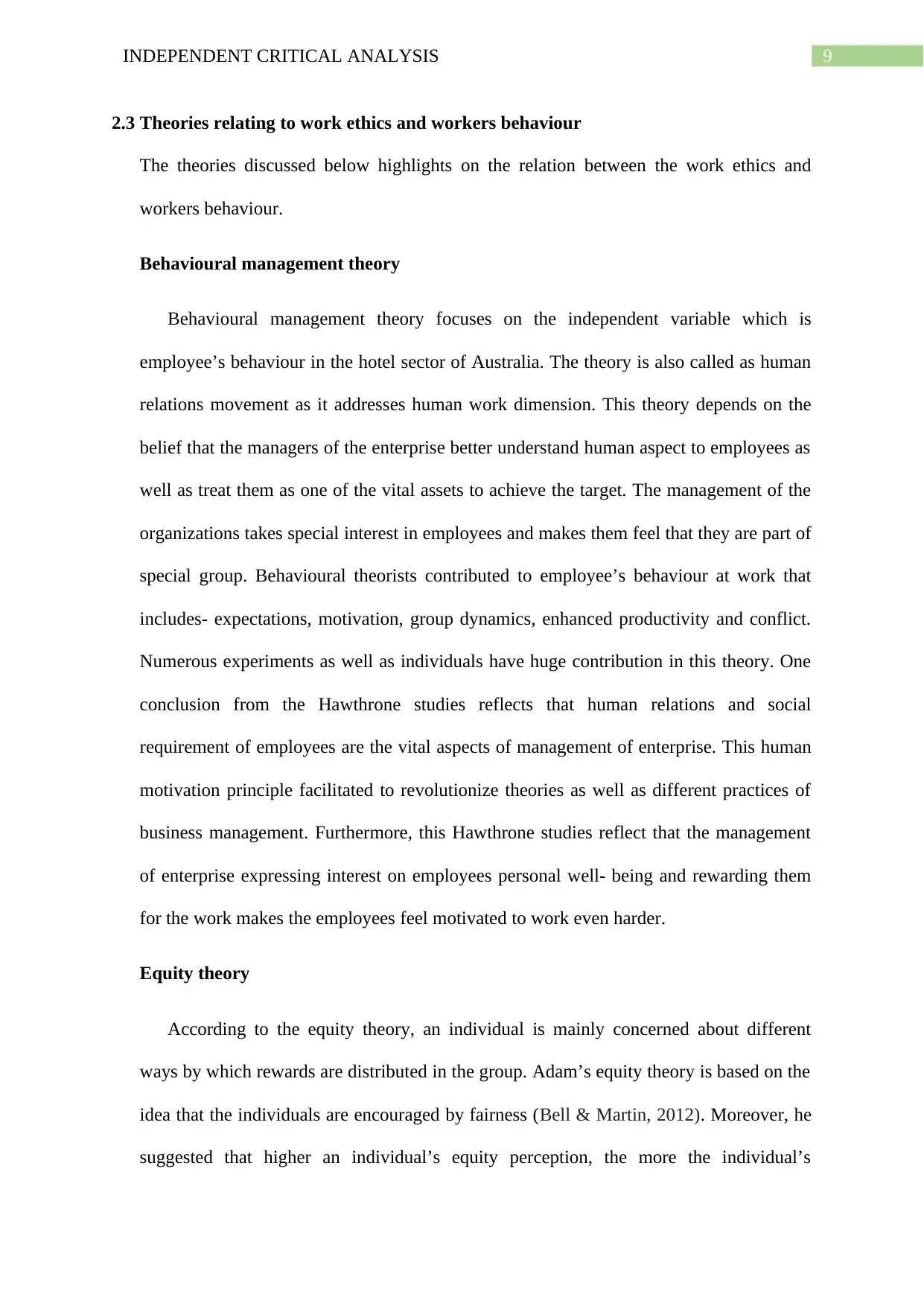
9INDEPENDENT CRITICAL ANALYSIS
2.3 Theories relating to work ethics and workers behaviour
The theories discussed below highlights on the relation between the work ethics and
workers behaviour.
Behavioural management theory
Behavioural management theory focuses on the independent variable which is
employee’s behaviour in the hotel sector of Australia. The theory is also called as human
relations movement as it addresses human work dimension. This theory depends on the
belief that the managers of the enterprise better understand human aspect to employees as
well as treat them as one of the vital assets to achieve the target. The management of the
organizations takes special interest in employees and makes them feel that they are part of
special group. Behavioural theorists contributed to employee’s behaviour at work that
includes- expectations, motivation, group dynamics, enhanced productivity and conflict.
Numerous experiments as well as individuals have huge contribution in this theory. One
conclusion from the Hawthrone studies reflects that human relations and social
requirement of employees are the vital aspects of management of enterprise. This human
motivation principle facilitated to revolutionize theories as well as different practices of
business management. Furthermore, this Hawthrone studies reflect that the management
of enterprise expressing interest on employees personal well- being and rewarding them
for the work makes the employees feel motivated to work even harder.
Equity theory
According to the equity theory, an individual is mainly concerned about different
ways by which rewards are distributed in the group. Adam’s equity theory is based on the
idea that the individuals are encouraged by fairness (Bell & Martin, 2012). Moreover, he
suggested that higher an individual’s equity perception, the more the individual’s
2.3 Theories relating to work ethics and workers behaviour
The theories discussed below highlights on the relation between the work ethics and
workers behaviour.
Behavioural management theory
Behavioural management theory focuses on the independent variable which is
employee’s behaviour in the hotel sector of Australia. The theory is also called as human
relations movement as it addresses human work dimension. This theory depends on the
belief that the managers of the enterprise better understand human aspect to employees as
well as treat them as one of the vital assets to achieve the target. The management of the
organizations takes special interest in employees and makes them feel that they are part of
special group. Behavioural theorists contributed to employee’s behaviour at work that
includes- expectations, motivation, group dynamics, enhanced productivity and conflict.
Numerous experiments as well as individuals have huge contribution in this theory. One
conclusion from the Hawthrone studies reflects that human relations and social
requirement of employees are the vital aspects of management of enterprise. This human
motivation principle facilitated to revolutionize theories as well as different practices of
business management. Furthermore, this Hawthrone studies reflect that the management
of enterprise expressing interest on employees personal well- being and rewarding them
for the work makes the employees feel motivated to work even harder.
Equity theory
According to the equity theory, an individual is mainly concerned about different
ways by which rewards are distributed in the group. Adam’s equity theory is based on the
idea that the individuals are encouraged by fairness (Bell & Martin, 2012). Moreover, he
suggested that higher an individual’s equity perception, the more the individual’s
Paraphrase This Document
Need a fresh take? Get an instant paraphrase of this document with our AI Paraphraser
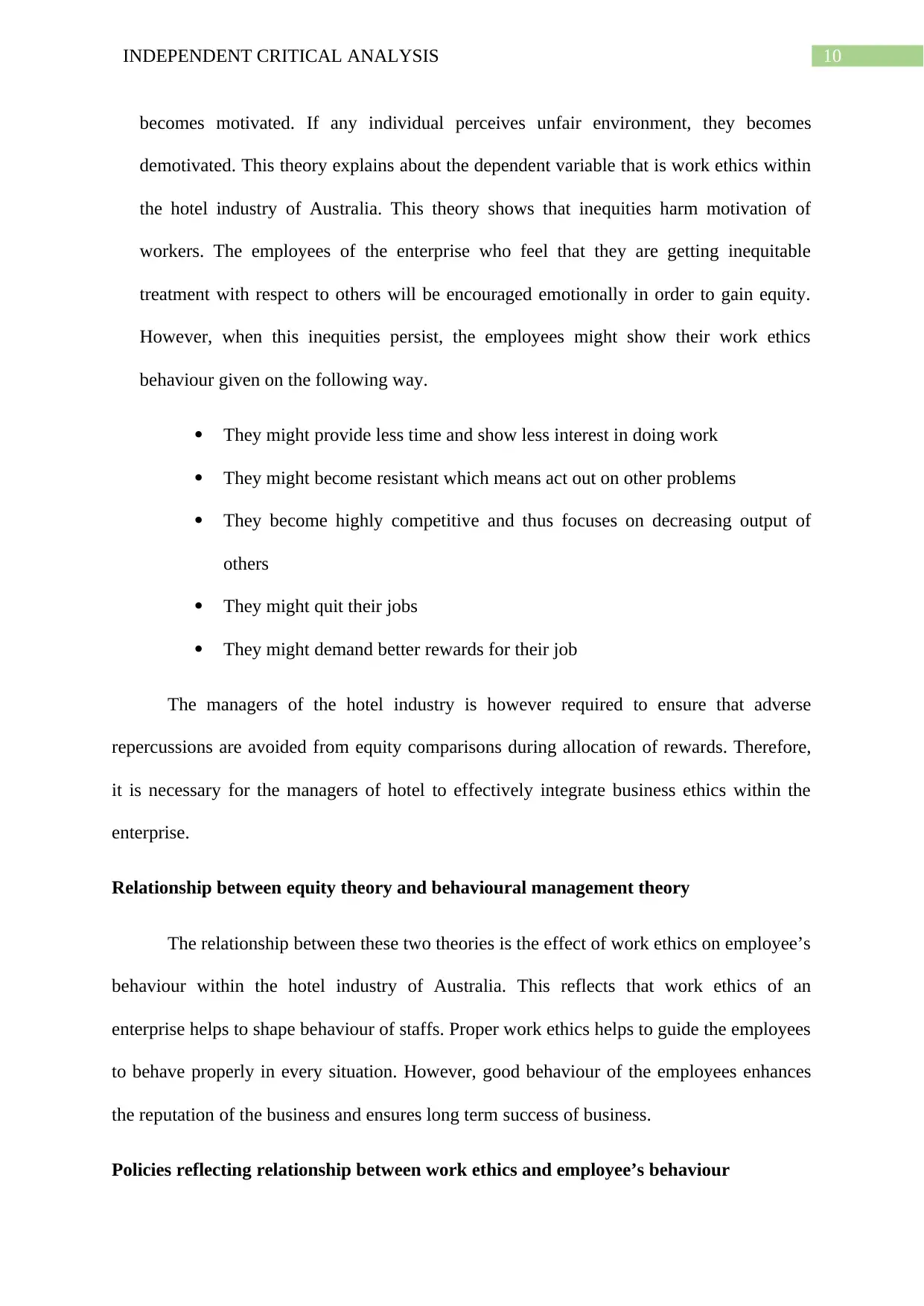
10INDEPENDENT CRITICAL ANALYSIS
becomes motivated. If any individual perceives unfair environment, they becomes
demotivated. This theory explains about the dependent variable that is work ethics within
the hotel industry of Australia. This theory shows that inequities harm motivation of
workers. The employees of the enterprise who feel that they are getting inequitable
treatment with respect to others will be encouraged emotionally in order to gain equity.
However, when this inequities persist, the employees might show their work ethics
behaviour given on the following way.
They might provide less time and show less interest in doing work
They might become resistant which means act out on other problems
They become highly competitive and thus focuses on decreasing output of
others
They might quit their jobs
They might demand better rewards for their job
The managers of the hotel industry is however required to ensure that adverse
repercussions are avoided from equity comparisons during allocation of rewards. Therefore,
it is necessary for the managers of hotel to effectively integrate business ethics within the
enterprise.
Relationship between equity theory and behavioural management theory
The relationship between these two theories is the effect of work ethics on employee’s
behaviour within the hotel industry of Australia. This reflects that work ethics of an
enterprise helps to shape behaviour of staffs. Proper work ethics helps to guide the employees
to behave properly in every situation. However, good behaviour of the employees enhances
the reputation of the business and ensures long term success of business.
Policies reflecting relationship between work ethics and employee’s behaviour
becomes motivated. If any individual perceives unfair environment, they becomes
demotivated. This theory explains about the dependent variable that is work ethics within
the hotel industry of Australia. This theory shows that inequities harm motivation of
workers. The employees of the enterprise who feel that they are getting inequitable
treatment with respect to others will be encouraged emotionally in order to gain equity.
However, when this inequities persist, the employees might show their work ethics
behaviour given on the following way.
They might provide less time and show less interest in doing work
They might become resistant which means act out on other problems
They become highly competitive and thus focuses on decreasing output of
others
They might quit their jobs
They might demand better rewards for their job
The managers of the hotel industry is however required to ensure that adverse
repercussions are avoided from equity comparisons during allocation of rewards. Therefore,
it is necessary for the managers of hotel to effectively integrate business ethics within the
enterprise.
Relationship between equity theory and behavioural management theory
The relationship between these two theories is the effect of work ethics on employee’s
behaviour within the hotel industry of Australia. This reflects that work ethics of an
enterprise helps to shape behaviour of staffs. Proper work ethics helps to guide the employees
to behave properly in every situation. However, good behaviour of the employees enhances
the reputation of the business and ensures long term success of business.
Policies reflecting relationship between work ethics and employee’s behaviour
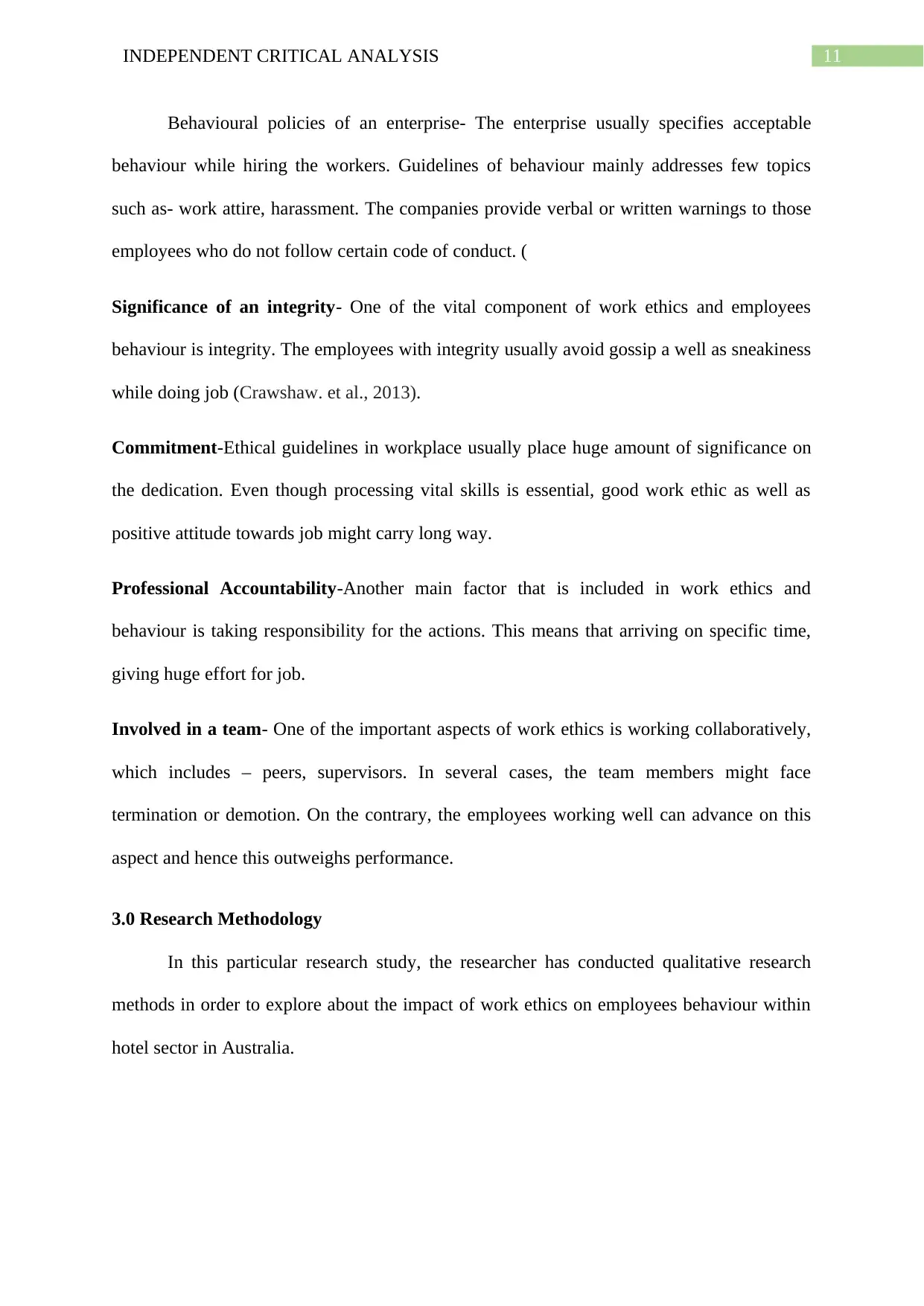
11INDEPENDENT CRITICAL ANALYSIS
Behavioural policies of an enterprise- The enterprise usually specifies acceptable
behaviour while hiring the workers. Guidelines of behaviour mainly addresses few topics
such as- work attire, harassment. The companies provide verbal or written warnings to those
employees who do not follow certain code of conduct. (
Significance of an integrity- One of the vital component of work ethics and employees
behaviour is integrity. The employees with integrity usually avoid gossip a well as sneakiness
while doing job (Crawshaw. et al., 2013).
Commitment-Ethical guidelines in workplace usually place huge amount of significance on
the dedication. Even though processing vital skills is essential, good work ethic as well as
positive attitude towards job might carry long way.
Professional Accountability-Another main factor that is included in work ethics and
behaviour is taking responsibility for the actions. This means that arriving on specific time,
giving huge effort for job.
Involved in a team- One of the important aspects of work ethics is working collaboratively,
which includes – peers, supervisors. In several cases, the team members might face
termination or demotion. On the contrary, the employees working well can advance on this
aspect and hence this outweighs performance.
3.0 Research Methodology
In this particular research study, the researcher has conducted qualitative research
methods in order to explore about the impact of work ethics on employees behaviour within
hotel sector in Australia.
Behavioural policies of an enterprise- The enterprise usually specifies acceptable
behaviour while hiring the workers. Guidelines of behaviour mainly addresses few topics
such as- work attire, harassment. The companies provide verbal or written warnings to those
employees who do not follow certain code of conduct. (
Significance of an integrity- One of the vital component of work ethics and employees
behaviour is integrity. The employees with integrity usually avoid gossip a well as sneakiness
while doing job (Crawshaw. et al., 2013).
Commitment-Ethical guidelines in workplace usually place huge amount of significance on
the dedication. Even though processing vital skills is essential, good work ethic as well as
positive attitude towards job might carry long way.
Professional Accountability-Another main factor that is included in work ethics and
behaviour is taking responsibility for the actions. This means that arriving on specific time,
giving huge effort for job.
Involved in a team- One of the important aspects of work ethics is working collaboratively,
which includes – peers, supervisors. In several cases, the team members might face
termination or demotion. On the contrary, the employees working well can advance on this
aspect and hence this outweighs performance.
3.0 Research Methodology
In this particular research study, the researcher has conducted qualitative research
methods in order to explore about the impact of work ethics on employees behaviour within
hotel sector in Australia.
⊘ This is a preview!⊘
Do you want full access?
Subscribe today to unlock all pages.

Trusted by 1+ million students worldwide
1 out of 23
Related Documents
Your All-in-One AI-Powered Toolkit for Academic Success.
+13062052269
info@desklib.com
Available 24*7 on WhatsApp / Email
![[object Object]](/_next/static/media/star-bottom.7253800d.svg)
Unlock your academic potential
Copyright © 2020–2026 A2Z Services. All Rights Reserved. Developed and managed by ZUCOL.





